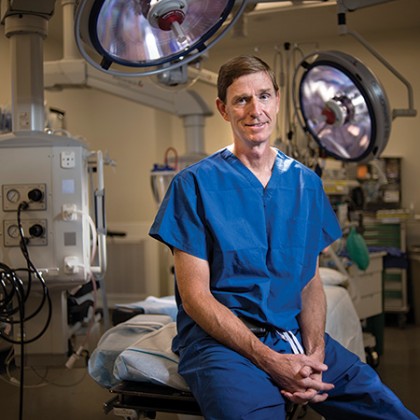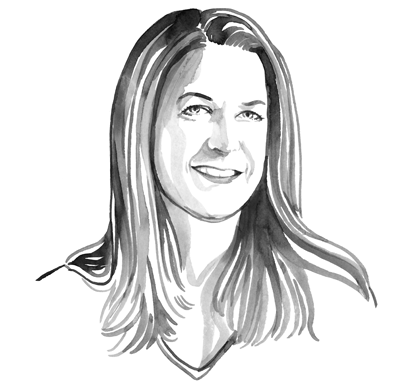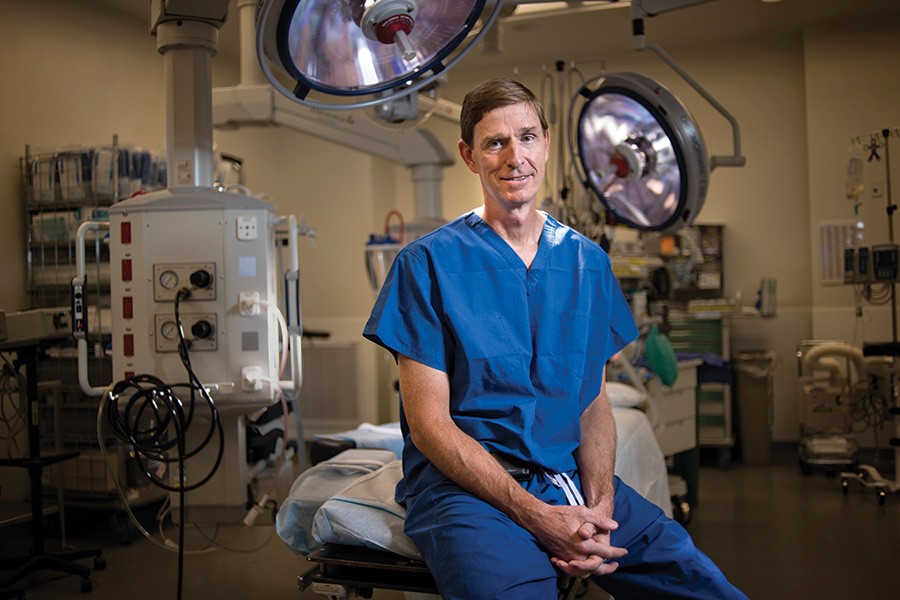Trivia: Drives a blue pickup truck (Tundra), still plays basketball regularly
Favorite music: Country!
Tell me a little about your path to where you are now. Did you know what you wanted to do in high school?

Image caption: Jon Weingart is a professor of neurological surgery in the School of Medicine and director of the neurosurgical operating room.
Image credit: Christopher Myers
Well, my father was a doctor, so medicine was always a possibility. But the whole application process was much simpler back then, when I was applying to college. Things were a lot more relaxed. I applied to just four places: UVA, a school in Ohio, and a couple of others. Then one day I was sitting in study hall and the kid sitting across the table flipped an application over to me, saying that he wasn't going to fill it out. So I did. It was to Duke, which I knew had just lost to Kentucky in the Final Four. I knew that Duke was a good school. I had zero idea where Durham was. But I applied and got in, and it was incredibly fortuitous for me.
Did you go because of basketball?
I played in high school and Mike Krzyzewski, who was then the coach at West Point, had expressed some interest in my going there to play. But I wasn't interested in the military. So I went to Duke. I played JV my freshman year, and then Duke hired Krzyzewski as the head coach and I got to play for him my sophomore year. It was an amazing experience.
How did you decide on surgery and particularly on neurosurgery?
Back then, Duke had an Early Identification Program, where you applied to medical school in your sophomore year, and I was accepted. In medical school, I sort of fell into the surgical side of things. I have a very regimented day with little open-endedness. I like starts and finishes. I gravitated toward the brain almost immediately. My father is a neurologist, so I knew something about brains.
What do brains smell like?
They don't smell like anything.
How has technology improved your task since you began working as a neurosurgeon? What new technology do you fantasize about?
The most important technology is something we call the viewing wand, a pointer that you can think of as a GPS for the brain. We had just begun testing it when I came to Hopkins. It uses high resolution MRI imaging. It tells you where you are and where you are going. Improvements in functional imaging will always be useful of course—technology is always improving to be more accurate. Minimally invasive approaches are also coming along, but it's hard to say how advantageous these new approaches will be.
What do you like most about teaching and practicing at Johns Hopkins?
Hopkins is great. The level of investment of energy here, from staff to nurses to physical therapy to the faculty, is amazing to me. The level of skill is spectacular. Someone is always doing something earth shattering. And Hopkins is an extraordinarily collegial place. In our department you're constantly going inside others' operating rooms to see things you don't do or don't do that often. There is a lot of sharing, and there should be.
Do you have a teaching philosophy?
I like to hang with the residents. We have a morning conference that is very casual.
I enjoy giving them pearls of wisdom about how best to get from start to finish, and why we do things the way we do them.
Do you like movies about brains? 'Frankenstein'? The new film, 'Lucy'?
Not particularly. I basically like movies that have happy endings. I liked The Monuments Men, and Once, the film about young musicians in Ireland. I like the Transformers movies too. And the Bourne series—I guess those are sort of about the brain, since they're about amnesia.
What do you do for fun?
The most fun I have is when I'm doing things with my family: hiking, biking, hanging out together. I like to play basketball. Recently I have started biking with my wife, Carol. We are training for a 150-mile, two-day bike ride for Johns Hopkins. The kids are off in college, and it's important to do things together.

Hollis Robbins, A&S '83, is chair of the Humanities Department at the Peabody Institute; she teaches courses in literature, drama, film, and aesthetics. She has a joint appointment in the Center for Africana Studies at Homewood, where she teaches African-American poetry and civil rights.
Posted in Voices+Opinion








